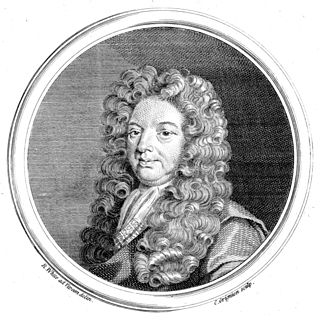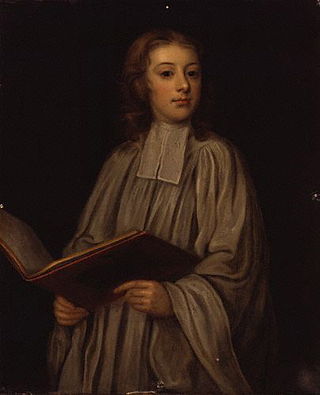Related Research Articles

John Blow was an English composer and organist of the Baroque period. Appointed organist of Westminster Abbey in late 1668, his pupils included William Croft, Jeremiah Clarke and Henry Purcell. In 1685 he was named a private musician to James II. His only stage composition, Venus and Adonis, is thought to have influenced Henry Purcell's later opera Dido and Aeneas. In 1687, he became choirmaster at St Paul's Cathedral, where many of his pieces were performed. In 1699 he was appointed to the newly created post of Composer to the Chapel Royal.

Sir John Stainer was an English composer and organist whose music, though seldom performed today, was very popular during his lifetime. His work as choir trainer and organist set standards for Anglican church music that are still influential. He was also active as an academic, becoming Heather Professor of Music at Oxford.

Sir John Goss was an English organist, composer and teacher.

William Croft was an English composer and organist.
Richard Brind was an English organist and minor composer of the 17th century.
Robert White probably born in Holborn, a district of London, was an English composer whose liturgical music to Latin texts is considered particularly fine. His surviving works include a setting of verses from Lamentations, and instrumental music for viols.

St Peter Mancroft is a parish church in the Church of England in the centre of Norwich, Norfolk. After the two cathedrals, it is the largest church in Norwich. It was originally established by Ralph de Gael, Earl of East Anglia, between 1066 and 1075. It was later rebuilt, between 1430 and 1455. It stands on a slightly elevated position, next to the market place.
Robert Parsons was an English composer of the Tudor period who was active during the reigns of King Edward VI, Queen Mary I and Queen Elizabeth I. He is noted for his compositions of church music.
Malcolm Archer is an English composer, conductor and organist. He was formerly Organist and Director of Music at Bristol Cathedral, at Wells Cathedral and at St Paul's Cathedral and Director of Chapel Music at Winchester College.

Belfast Cathedral, also known as St Anne's Cathedral, is a Church of Ireland cathedral in Donegall Street, Belfast, Northern Ireland. It is unusual in serving two separate dioceses. It is the focal point of Belfast's Cathedral Quarter.
Philip John Moore is an English composer and organist.
Nathaniel Giles was an English Renaissance organist and composer. He was the organist for Worcester Cathedral and wrote Anglican anthems.

Richard Hey Lloyd was a British organist and composer.
Reginald Tustin Baker was an English organist and composer.

Thomas Tudway was an English musician and Professor of Music at Cambridge University. He is known as a composer, and for his compilation of a collection of Anglican church music.

Drexel 4180–4185 is a set of six manuscript partbooks copied in Gloucester, England, containing primarily vocal music dating from approximately 1615-1625. Considered one of the most important sources for seventeenth century English secular song, the repertoire included represents a mixture of sacred and secular music, attesting to the partbooks' use for entertainment and pleasure, rather than exclusively for liturgical use.
The Forrest-Heyther partbooks are a set of six manuscript partbooks copied in England in the sixteenth century. They are an important source of polyphonic Mass Ordinary settings by composers from the reign of Henry VIII, including John Taverner and Robert Fayrfax.
Vaughan Richardson was an organist at Winchester Cathedral, and a composer, particularly of church music.

Choirs of Charity Children became a feature of London parish church music in the 18th century. From 1704 to 1877 they combined for an annual benefit concert and the impression of massed voices numbering in the thousands was remarked on by visitors including William Blake, Joseph Haydn and Hector Berlioz.